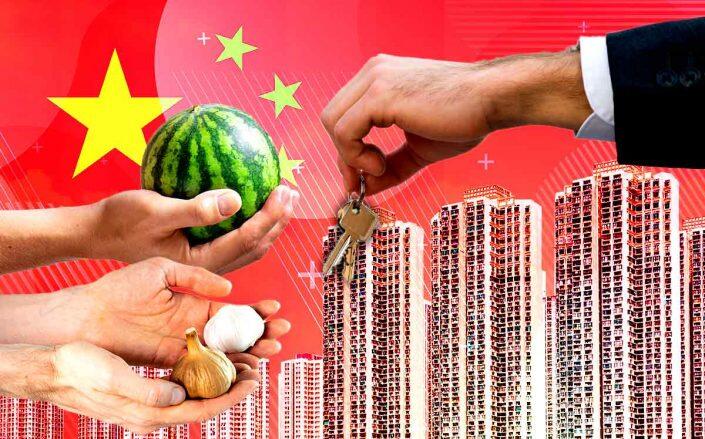With a GDP value of USD 19 trillion, China is the world’s second-largest economy. Following the capitalist policy in the economy, China attracted huge foreign investment at the start of the 21st century. But, rooted in the communist polity, it continued to be a ‘bubble’ economy that could burst anytime with simple pressure. The Covid-pandemic and the decision thereof by the Chinese Communist Party created such circumstances that seem to have flattened the Chinese economy.
Homes in exchange for watermelon, wheat, or garlic
News reports coming in the media suggest that the pandemic and economic slowdown thereof has slumped the property market. People are reluctant to buy a new property and even don’t have money to pay for the already bought property. Struggling with the payment, developers have started to take payment for homes in the form of watermelons, peaches, garlic and other agricultural products.
One of the property developers, estate builder Central China Management said on social media,” On the occasion of the new garlic season, the company has made a resolute decision to benefit garlic farmers in Qi country. We are helping farmers with love, and making it easier for them to buy homes.”
According to the report published in the South China Morning Post, one property developer, Nanjing’s Seazen Holdings, launched a proper watermelon-homes buyout scheme from June 28 to July 15. Rather than the market price of 2 to 4 yuan, developers are ready to pay 20 yuan per kilogram for watermelon in the home buyout case.
These lucrative and barter schemes are reflective of dying demand and prices in real estate. On one hand, the Chinese government has issued a directive against any price cut in the home buyout and on the other, property developers are strangling themselves in the recurring debt trap. Cumulatively hit by the pandemic lockdown, the people don’t have money and to increase the demand, property developers are resorting to barter schemes.
Dictators rule, and people pay
During the Covid Pandemic, China imposed the toughest lockdown policy in the world. The communist government and its dictatorial policies imposed unreasonable lockdowns throughout the country. Every industry, company, vehicular or personal movement was stopped during the lockdown and the country stood still throughout the lockdown.
According to a report, about 18% of the GDP of China comes from the export of goods and services. The complete lockdown stopped production and whole export industries were ruined during the lockdown.
Moreover, when India started to open its economy, China was once again hit by a new variant of the covid. Dealing with successive waves, China was not able to open its economy and incurred huge losses due to this. According to a report, 54.4% of the national GDP and half of the population were negatively impacted by the harsh lockdown and the latest outbreak of the Chinese Virus.
Further, the post-pandemic world order and the Ukraine war created global discontentment against China and its market. In an effort to diversify the global supply chain market, many multinational companies like Nike, Apple, Samsung, LG Electronics, Adidas, Puma, Airbnb, Foxconn, KIA Motors, Hyundai, Dell, HP, Google, Microsoft, and other manufacturers started to shift its production from China. The mass shift in the manufacturing base affected the employment rate in China and created a mass crunch of money. The recurring effect of unemployment and cash crunch affected other local industries. Therefore the real estate market forcefully resorting to barter schemes is one of the biggest victims of the dictatorial policy of China.
Support TFI:
Support us to strengthen the ‘Right’ ideology of cultural nationalism by purchasing the best quality garments from TFI-STORE.COM
